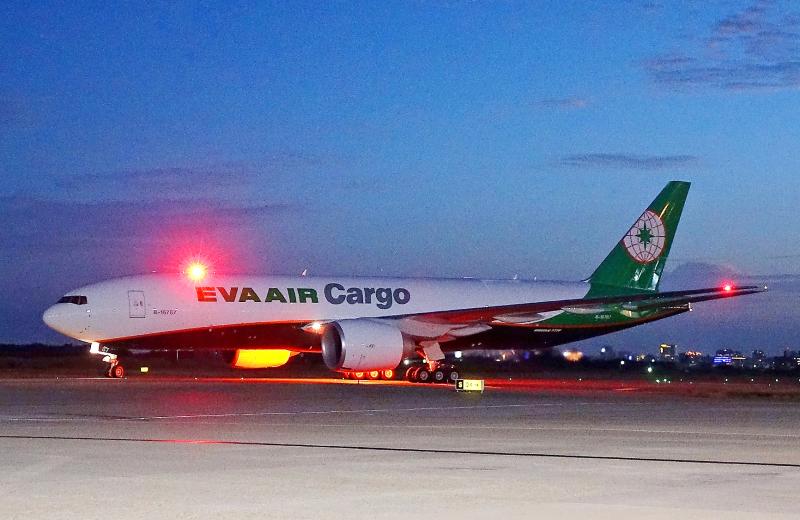EVA Airways Corp (長榮航空) on Friday received a new Boeing Co 777F cargo jet, the first delivery of a freight aircraft for the airline in two years.
Prior to taking possession, EVA Airways’ cargo fleet had five Boeing 777F jets that it received in 2019.
The airline expects to take delivery of another two Boeing 777Fs next month and in December, it said in a statement.

Photo: Chu Pei-hsiung, Taipei Times
EVA last year canceled orders for seven Boeing 787-10 Dreamliner passenger jets, replacing them with orders for three 777F cargo aircraft and four smaller 787-9 passenger jets, as the airline faced low demand for air travel but robust orders for air shipping.
Due to strong cargo demand, EVA currently conducts more than 40 cargo flights a week with its five freight carriers, and operates another 50 cargo flights per week with its 33 passenger jets, with goods loaded in the passenger cabins, it said.
The three new freight aircraft would boost cargo capacity and increase revenue this year, EVA said.
The sixth cargo jet would be utilized for flights to Southeast Asian countries and North America, it said.
With strong demand for transport of new electronic products and mobile devices in the peak season, the company holds an upbeat outlook for its cargo business this quarter, EVA president Clay Sun (孫嘉明) said in the statement.
Airfreight rates are likely to remain high next year due to a tight supply of cargo flights and congestion at the world’s major seaports, Sun said.
The International Air Transport Association has predicted that global air cargo volume for this year is expected to be higher than in 2019, and is projected to grow 4.9 percent year-on-year next year, EVA said.
The Boeing 777F is the largest twin-engine, energy-efficient freighter, and as the aircraft has identical engine specifications as the Boeing 777-300ER, of which EVA has 34, the airline could reduce its maintenance costs and boost maintenance efficiency with the consistent fleet, it said.

CHIP WAR: Tariffs on Taiwanese chips would prompt companies to move their factories, but not necessarily to the US, unleashing a ‘global cross-sector tariff war’ US President Donald Trump would “shoot himself in the foot” if he follows through on his recent pledge to impose higher tariffs on Taiwanese and other foreign semiconductors entering the US, analysts said. Trump’s plans to raise tariffs on chips manufactured in Taiwan to as high as 100 percent would backfire, macroeconomist Henry Wu (吳嘉隆) said. He would “shoot himself in the foot,” Wu said on Saturday, as such economic measures would lead Taiwanese chip suppliers to pass on additional costs to their US clients and consumers, and ultimately cause another wave of inflation. Trump has claimed that Taiwan took up to

A start-up in Mexico is trying to help get a handle on one coastal city’s plastic waste problem by converting it into gasoline, diesel and other fuels. With less than 10 percent of the world’s plastics being recycled, Petgas’ idea is that rather than letting discarded plastic become waste, it can become productive again as fuel. Petgas developed a machine in the port city of Boca del Rio that uses pyrolysis, a thermodynamic process that heats plastics in the absence of oxygen, breaking it down to produce gasoline, diesel, kerosene, paraffin and coke. Petgas chief technology officer Carlos Parraguirre Diaz said that in

Japan intends to closely monitor the impact on its currency of US President Donald Trump’s new tariffs and is worried about the international fallout from the trade imposts, Japanese Minister of Finance Katsunobu Kato said. “We need to carefully see how the exchange rate and other factors will be affected and what form US monetary policy will take in the future,” Kato said yesterday in an interview with Fuji Television. Japan is very concerned about how the tariffs might impact the global economy, he added. Kato spoke as nations and firms brace for potential repercussions after Trump unleashed the first salvo of

SUPPORT: The government said it would help firms deal with supply disruptions, after Trump signed orders imposing tariffs of 25 percent on imports from Canada and Mexico The government pledged to help companies with operations in Mexico, such as iPhone assembler Hon Hai Precision Industry Co (鴻海精密), also known as Foxconn Technology Group (富士康科技集團), shift production lines and investment if needed to deal with higher US tariffs. The Ministry of Economic Affairs yesterday announced measures to help local firms cope with the US tariff increases on Canada, Mexico, China and other potential areas. The ministry said that it would establish an investment and trade service center in the US to help Taiwanese firms assess the investment environment in different US states, plan supply chain relocation strategies and